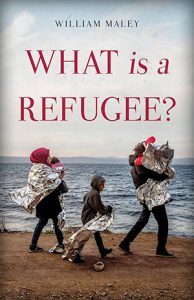What is a Refugee?

With the recent arrival in Europe of over a million refugees and asylum-seekers, a sense of panic began to spread across the continent and beyond. William Maley’s illuminating introduction offers a guide to the complex idea of ‘the refugee’ and sets the current crisis within the wider history of human exile, injecting much-needed objectivity and nuance into the debate.
Arguing that Western states are now reaping the consequences of policies aimed at blocking safe and ‘legal’ access to asylum, What is a Refugee? shows why many proposed solutions to the refugee ‘problem’ will exacerbate tension and risk fuelling the growth of extremism among people who have been denied all hope.
This lucid book also tells of the families and individuals who have sought refuge, highlighting the suffering, separation and dislocation on their perilous journeys to safety. Through such stories we can begin to answer the question, what is a refugee?
Table of Contents
Preface and Acknowledgements
1. Introduction
Some categories and distinctions
Some recurring themes
The objectives and structure of this book
2. Defining ‘Refugees’
International refugee law: origins
The Office of the United Nations High Commissioner for Refugees (UNHCR)
The 1951 Convention Relating to the Status of Refugees
Broader legal definitions
Refugee protection under other branches of law
Status determination by states
Ordinary language understandings of ‘refugee’
Philosophical definitions of ‘refugee’
3. Exile and Refuge: A Brief Overview
Political violence, marginalisation and the human experience
Exile and ideology from the seventeenth to the early twentieth centuries
Russian and German refugees between the World Wars
Postwar refugee resettlement
Internal conflict and refugee movements in the late twentieth and early twenty-first centuries
4. States and Refugees
The Westphalian system
Bureaucracy and its failings
Individual initiatives
People smuggling: a product of state inaction
5. Roots of Refugee ‘Crises’ in a Globalised World
State disruption and violent conflict
The fear of ‘terrorism’
Transport, the wherewithal to travel, and human mobility
Globalisation and its impacts
6. Diplomacy and Refugees
Frameworks for negotiation over refugees
‘Burden sharing’ and its dilemmas
The temptation of ‘easy options’
Refugees as agents
7. Refugees, Intervention and the ‘Responsibility to Protect’
The use of force
The idea of humanitarian intervention
The Responsibility to Protect
‘Intervention’ as a solution
8. ‘When Adam Delved and Eve Span…’: Some Reflections on Closing and Opening Borders
The costs of controlled borders
The moral costs of refugee exclusion
Confronting the ‘Birthright Lottery’
A final word
Notes
Index
Topics
1. Introduction
Asylum & Asylum Seekers, Refugees & Forced Migration, Asylum & Refugee System, Ethics & Morality, Philosophy, History, Family, Testimonies
2. Defining ‘Refugees’
Law, Jurisprudence, Legal Theory; The Status of Refugees, International Law, The 1951 Refugee Convention, UNHCR, International Protection, Protection, Refugee Status Determination
3. Exile and Refuge: A Brief Overview
Politics & Power, Policy & Practice, Refugee Management/Governance, Violence & Mass Violence, Marginalization, Exile & Exodus, Conflict & Post-Conflict, Refugee Resettlement, World War I, World War II
4. States and Refugees
Fragile State, Legality & Illegality, Smuggling & Human Trafficking
5. Roots of Refugee ‘Crises’ in a Globalised World
Root Causes, Terror & Terrorism, Extremism, Suffering, Mobility & Immobility, Globalization
6. Diplomacy and Refugees
Diplomacy, Refugee Burden/Responsibility Sharing, Refugees’ Roles & Self-Reliance
7. Refugees, Intervention and the ‘Responsibility to Protect’
Foreign Intervention, Humanitarian Action & Humanitarianism, The Responsibility to Protect
8. ‘When Adam Delved and Eve Span…’: Some Reflections on Closing and Opening Borders
Borders, Immigration Control, Safety, Security, Separation, Exclusion, Freedom to Move and to Stay, Movement of People and Ideas

William Maley is Professor in the Department of International Relations, Australian National University. Previously he was the Foundation Director (2003-2014) of the Asia-Pacific College of Diplomacy. He taught for many years in the School of Politics, University College, University of New South Wales, Australian Defence Force Academy, and has served as a Visiting Professor at the Russian Diplomatic Academy, a Visiting Fellow at the Centre for the Study of Public Policy at the University of Strathclyde, and a Visiting Research Fellow in the Refugee Studies Programme at Oxford University. He is a Barrister of the High Court of Australia, Vice-President of the Refugee Council of Australia, and a member of the Australian Committee of the Council for Security Cooperation in the Asia Pacific (CSCAP). He is also a member of the Editorial Board of the journal Global Responsibility to Protect, and of the International Advisory Board of the Liechtenstein Institute on Self-Determination at Princeton University. In 2002, he was appointed a Member of the Order of Australia (AM). In 2009, he was elected a Fellow of the Academy of the Social Sciences in Australia (FASSA).
Source: https://dpa.bellschool.anu.edu.au/experts-publications/experts/william-maley-am
More from William Maley in this library, click here.
